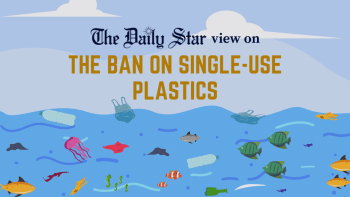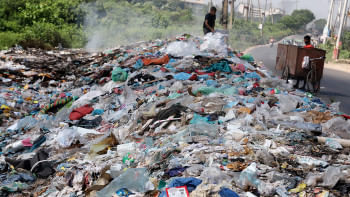Plastic garbage is choking us to death!

The choking of most drains in Khulna city due to indiscriminate dumping of garbage, as reported by this newspaper on Saturday, paints a picture of unplanned waste disposal that, unfortunately, plagues the entire country. The most frightening aspect of this garbage fiasco is that it contains thousands of tons of plastic waste which is not biodegradable and wreaks havoc on the environment as well as people's health.
In Khulna, there is a huge dearth of bins leading to residents dumping trash into open drains and even roadside spaces, and it is happening under the nose of the local administration. Efforts to clean the drains have been apparently slowed due to "manpower shortage". The narrative remains the same in many other cities and towns as well, with little progress being achieved in terms of solving our garbage problem. Equally distressing is the accumulation of plastics as a result of this problem. Plastics and polythene not only clog the drains and water bodies, causing waterlogging; they also enter the soil ruining its fertility by killing larvae, earthworms and microbes. The toxic chemicals of micro-plastics also enter the food chain harming the health of humans and animals – another devastating result of this monstrous pile-up of plastics.
Last month, the prime minister warned about the plastic pollution. She said that her government had taken multifaceted initiatives to reduce plastic production and ensure proper waste management. We earnestly urge the government to speed up these initiatives and implement them at the ground level. This should include a multi-ministerial body that will monitor these efforts and rigorously ensure that dumping of plastics into water bodies, including drains, is prevented. The government must vigorously enforce the recycling of plastics. The various environment-related acts adopted by the government have to be enforced. This includes the Mandatory Jute Packaging Act 2013 which aims to replace plastic packaging with jute packaging. In fact, we must revive our original initiatives to completely ban polythene and replace them with biodegradable jute bags.
The state of drains and unregulated dumping of garbage across the cities in Bangladesh are a wakeup call about the urgency of addressing the plastic menace. Proper waste management with the help of adequate manpower, removal of plastics from the environment and effective recycling efforts have to be part of our development agenda going forward.


 For all latest news, follow The Daily Star's Google News channel.
For all latest news, follow The Daily Star's Google News channel. 










Comments